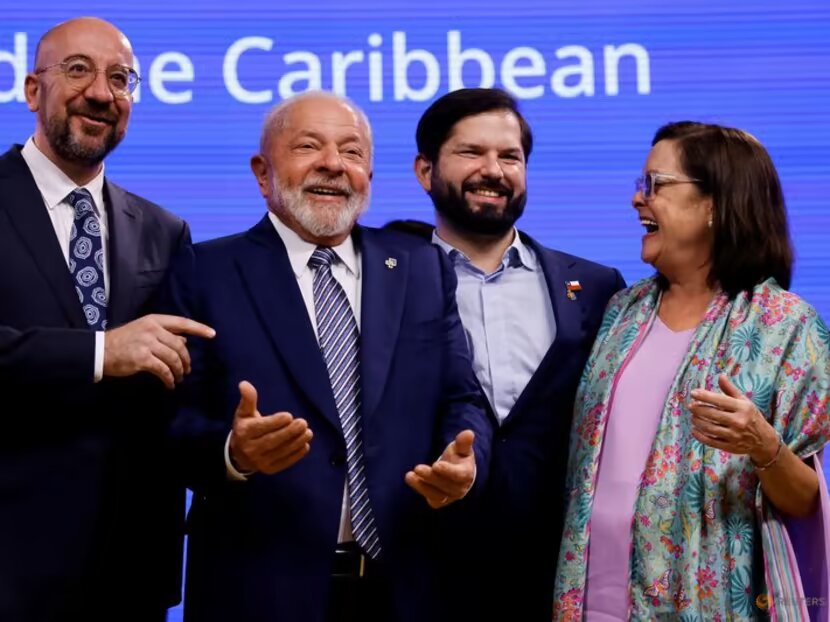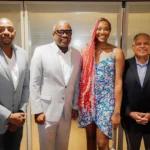BRUSSELS (Reuters) — The European Union pledged more investment for the Caribbean and Latin America at a financial summit in Belgium on Monday.
The EU is pivoting after reassessing international relationships in light of Russia’s illegal war on Ukraine and its growing wariness of China.
As more than 50 leaders from Europe, Latin America and the Caribbean gathered in Belgium, European Commission President Ursula von der Leyen told a business forum that the three regions needed each other more than ever.
She cited the repercussions of the coronavirus pandemic, the war in Ukraine and “China’s growing assertiveness abroad” as challenges that the trio should face together.
“Europe aspires to be the partner of choice for Latin America and the Caribbean,” she said.
The EU is the biggest foreign investor in Latin America and the Caribbean but China has become its second biggest trading partner, behind only the United States.
Von der Leyen said the EU was planning 45 billion euros of investment in Latin America and the Caribbean as part of its Global Gateway scheme, widely seen as a rival to China’s Belt and Road Initiative of infrastructure investments.
The summit of the EU and the Community of Latin American and Caribbean States (CELAC) is the first in eight years. EU officials have billed it as a chance to revitalize a relationship that many say the bloc had neglected.
“We have been arrogant as Europeans,” said Dutch Prime Minister Mark Rutte. He said Europe had been quick to press for help in isolating Russia but had not been responsive enough to others’ concerns in recent years.
COMMUNIQUE CLASH
Despite much talk of common values at the summit, discussions over the communique highlighted differences over how to address the war in Ukraine and Europe’s historical role in the slave trade.
EU officials say they want clear condemnation of Russia. But while most CELAC countries backed a UN resolution in February demanding an immediate Russian troop withdrawal, Nicaragua voted against and Bolivia, Cuba and El Salvador abstained.
Brazilian President Luiz Inacio Lula da Silva did not repeat his criticism of the West for giving arms to Ukraine but said the war diverted resources from key priorities elsewhere.
“The war in the heart of Europe throws a blanket of uncertainty over the world and channels resources that were essential for the economy and social programs to war purposes,” he said.
“The race for weapons makes tackling climate change even more difficult.”
Ralph Gonsalves, prime minister of Saint Vincent and the Grenadines, the current holder of the CELAC presidency, said he hoped the communique would include language on “the historical legacies of native genocide and enslavement of African bodies and something towards reparatory justice”.
“This is a subject on which we need to have a mature conversation,” he said.
But some European governments were wary of proposed language on reparations, diplomats said.
On the economic front, the EU is looking to forge new energy partnerships after severing ties with Russia.
It also wants to reduce reliance on China and secure minerals for electric vehicles and the broader transition to a low carbon economy, a supply chain China dominates.
Although keen for EU investment, CELAC partners generally want the economic benefits of processing and producing lithium batteries or electric vehicles, rather than the smaller returns of shipping minerals to be processed elsewhere.
The EU is pressing ahead with a trade agreement with Chile, the world’s largest copper producer and second largest lithium producer. Officials have said it could enter force next year.
The EU is also seeking to unlock trade deals struck with Mexico in 2018 and with the Mercosur bloc of Argentina, Brazil, Paraguay and Uruguay in 2019, though officials have played down expectations of any breakthroughs during the summit.
($1 = 0.8907 euros)
By Philip Blenkinsop and Andrew Gray/REUTERS
Additional reporting by Catarina Demony, Belen Carreno, Marine Strauss, Tassilo Hummel and Benoit Van Overstraeten; writing by Phiilp Blenkinsop and Andrew Gray; editing by Barbara Lewis, Christina Fincher and Alex Richardson
Our Standards: The Thomson Reuters Trust Principles.



